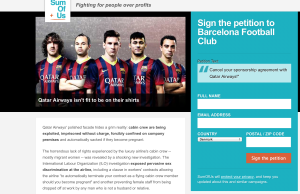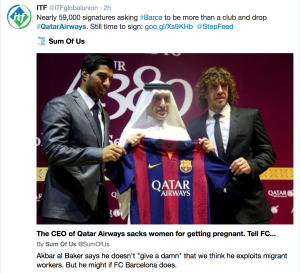As the business of sports enhances its relationship with fans to drive revenues, the importance of CSR has established itself as a key focus area. Strategic utilization of CSR for commercial purposes revolves around fan-generated revenue streams, e.g. ticket and merchandise sales. Sports sponsorship also presents a commercial platform through which strategic CSR may drive revenues and impact in an era where sports management have been solid integrated with entertainment, media and experiential marketing opportunities. Over the years, CSR has become a strategic asset for sports entities to engage its stakeholders for indirect and direct profitability reasons and today’s sports world holds more and more examples of sports entities being negatively and positively accustomed with CSR.
Sports governing bodies are fully aware that higher ethical and sustainability benchmarks are worth aiming for although the recent FIFA scandal (i.e. corruption at the highest management levels) shows that it has taken the world’s leading football governing body a while to recognize this. Sustainability is valuable in securing votes and in pushing sports forward in a good way. The professional and the grassroots levels of sports are looking for pubic and financial support. In this process, financial impact goes hand in hand with social and environmental impact of these sports entities.
With this development in mind, sports entities are trying to affect fan behavior, sports consumption and revenue generation by displaying unique sports sponsorship stories and opportunities to large corporations that correspond perfectly with these brands’ intent to make a difference in a given community or across several communities. This may form a difficult path that forces sports entities and corporate sponsors to assess their own behavioral patterns and to act in ways aligned with the CSR objectives or policies that should follow a sports sponsorship engagement linked to CSR. This evidenced in the example below.
Photo: The official petition to make FC Barcelona cancel its shirt sponsorship from Qatar Airways.
FC Barcelona is known for the association with the label ‘more than a club’ but lately the club has been publicly pressured by a petition requiring the club to cancel its sponsorship agreement with shirt sponsor Qatar Airways due to claims that the airline has maltreated female workers. Qatar Airways came under pressure for a sub-clause allowing it to fire pregnant staff and that has created a ‘shit storm’ via online platforms in which the club’s fans have attacked the club’s change of UNICEF as a shirt sponsor to Qatar Airways. Almost 60,000 have signed the petition in a few days to have Qatar Airways replaced as a sponsor. This marks an interesting dilemma for a club that for many years was associated with fairness, sustainability and fine moral values. Therefore, the Qatar Airways sponsorship deal clashes with FC Barcelona’s CSR-status as there is no excuse for corporate sponsors exploiting their employees.
However, the case portrays a paradox in sports sponsorship in the sense that corporate sponsors often drop their sponsored athletes and clubs if they are caught in misconduct but that seldom goes the other way. This has to do with competition among sports entities being so fierce and associated with money to support future performance opportunities. The sports world is characterized by so many examples of sports clubs not saying no to capital injections from questionable corporate sponsors or owners. On the other hand, there are not many examples of corporate sponsors sticking with their sports property if that one is questionable but it is seen when a sports property is too valuable to let go, e.g. the case of FIFA and its corporate sponsors or when Nike stayed with Tiger Woods following his infidelity.
Photo: ITF’s (an international trade union federation for transportation workers’ unions) protests the actions of Qatar Airways via FC Barcelona on Twitter.


COMMENTS
No comments yet.